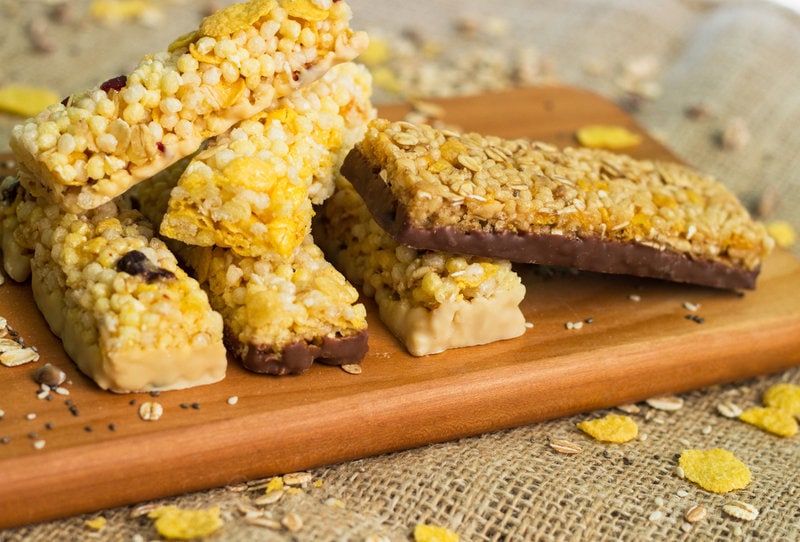People appear to believe that healthy food is a relatively new concept. However, it had existed since at least the late 19th century, when it was fashionable to become more health conscious. Granola bars are now well-known for being nutritious and suitable choices for breakfast. We may be tempted to share it with dogs, but can dogs eat granola?
Yes, granola is safe for dogs to eat. However, this is only true when it comes in its purest forms, that is, oats and brown rice. Granola comes in many forms with several granola-based products like granola bars, and as a rule of thumb, the fewer additives, the better it becomes for your dog.
What are the advantages of granola for dogs’ health? Can you create your own dog granola? Do you have any granola bars? Can dogs consume them? You have come to the precise place if you’re looking for answers to any or all of these questions. Continue reading to learn all there is to know about giving granola to dogs.
Can Dogs Eat Granola And Granola Bars?

As mentioned, dogs can safely consume granola and granola bars. However, it all depends on what ingredients are in the granola.
Granola can simply be described as rolled oats and puffed brown rice. They are carbohydrates that help improve your dog’s energy and are also a good source of fiber for better digestion.
On the other hand, granola bars make a great snack for your pooch. Most commercial granola bars have additional ingredients, such as nuts, dried fruits, and whole grains, and some also include preservatives, artificial sweeteners, sugar, and flavorings.
While most of these ingredients look good, your dog shouldn’t ingest them, at least not on a regular basis. Moderation is key.
Do Dogs Like Eating Granola?
Yes. As a pet parent, you’re probably aware that your dog wants to eat practically everything you eat. This also applies to granola. Granola, with its satisfying crunch, is a great option for dogs to chew on during the day.
Can Puppies Eat Granola?
No. If it weren’t for the sugar in granola, your small furry friend would enjoy it as a snack. If sugar may harm an adult dog’s health, it might do worse for a puppy.
Therefore, it is preferable to wait a few months before introducing them to meals associated with humans, such as granola. You can gradually add these to their diet after they are three to four months old.
Are There Any Health Benefits Of Granola And Granola Bars?
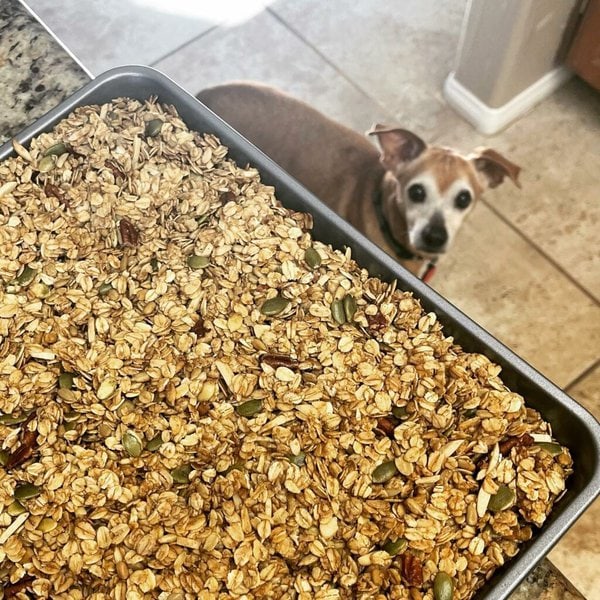
Although the components in granola bars might vary greatly, some often recurring ingredients may be beneficial for your dog.
Oats
When consumed in moderation, cooked oatmeal can be a nutritious supplement to a dog’s diet and has possible health advantages.
Small amounts of carbs are beneficial for dogs, and oats are a great option for dogs that have sensitivity to other grains. Oats mainly contain linoleic acid, omega-6 fatty acids, and vitamin B, which support healthy skin and coats.
Puffed Rice
While it has no protein and few vitamins, puffed rice is an excellent gluten-free option for dogs with sensitivities to wheat or other grains.
The rice’s insoluble fiber makes it a very useful tool in the fight against constipation. In addition, Vitamins D and B found in brown rice are crucial for cardiovascular health.
Seeds
Some of the seeds in granola bars benefit your dog’s diet. Flaxseeds, which are rich in essential fatty acids, protein, and fiber, are a great example of such seeds.
Pumpkin seeds, which are rich in nutrients like iron, calcium, and B vitamins and act as a natural dewormer, may also be found in some. Also, chia seeds are advantageous due to their high levels of beneficial nutrients like fiber and essential fatty acids.
Is It Bad If A Dog Eats A Granola Bar?
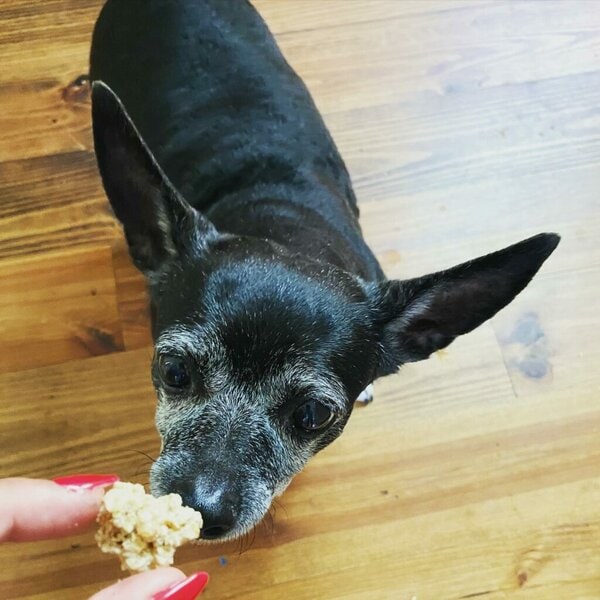
Granola can be unhealthy for dogs, especially when they are filled with salt and sugar. Granola bars also have a lot of calories, which can be a lot for small dogs.
Taking too much sugar can result in diabetes, weight gain, metabolic changes, dental problems, and even pancreatitis, whereas consuming too much salt can result in sodium overdose.
Here is a list of ingredients deemed to be unhealthy for dogs to consume:
Fiber
Granola’s fiber content poses the greatest threat to dogs who eat it. Oatmeal and brown rice might be better options for the dog because the fiber might temporarily cause diarrhea. In case you’re interested in making granola at home, consider using oatmeal and brown rice.
Nuts
Many granola bars contain nuts, which might be problematic for some dogs. Occasionally feeding your dog peanuts or almonds might be fine.
If you want to ensure things remain simple for your dog, you can add some plain granola to a spoonful of peanut butter, which is okay for dogs.
Walnuts, cashews, and pecans, which are also commonly included in granola bars, can, if consumed in excess, cause vomiting, diarrhea, and even seizures.
Sugar
Like humans, dogs, too, enjoy sugary things. However, sugar can cause much more harm to a dog’s health than it does to humans.
While sugar isn’t directly hazardous to dogs, regular sugar consumption can cause conditions, such as diabetes and obesity. Dogs’ lives are allegedly shortened by sugar.
Sodium
Dogs who consume high amounts of sodium become excessively thirsty with time. Your pet may become dehydrated if you give them excessive amounts of granola with sodium.
Sodium ion poisoning, which has symptoms including vomiting, diarrhea, tremors, convulsions, high temperature, etc., can also be brought on by consuming too much sodium.
Fat And Cholesterol
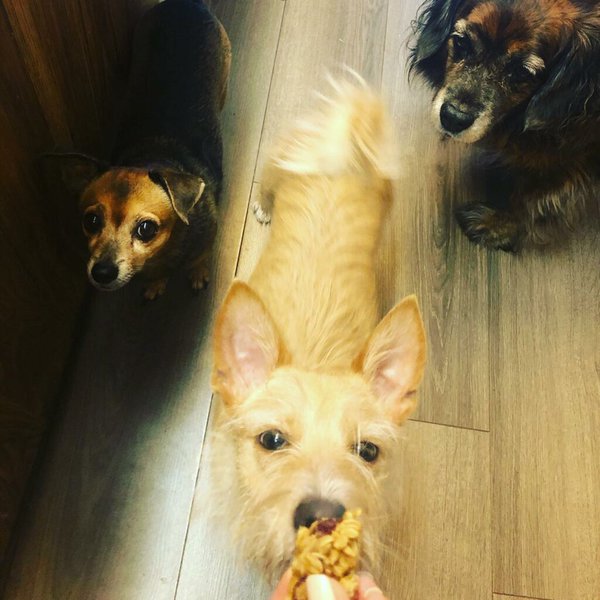
You shouldn’t feed your pet fatty granolas on a regular basis. Your dog becomes lethargic, gains weight, and becomes obese as a result.
Although cholesterol is okay for dogs to consume, excessive amounts can result in a rare condition called arteriosclerosis. In this condition, cholesterol builds up in their arteries, possibly resulting in a heart attack.
Raisins
You can find raisins in a variety of granola bars. Even while veterinarians and scientists are unsure of exactly what component in raisins makes them hazardous to dogs, the truth is that even one raisin can be fatal to your pet.
You should never let your dog eat these substances since they can cause acute kidney failure.
Xylitol
Xylitol, a popular low-calorie artificial sweetener found in granola bars and cereals, is extremely poisonous to dogs and can cause a sharp drop in blood sugar levels.
How Much Granola Can Dogs Eat?
The secret is portion control, just like with anything else you’re thinking of putting in your dog’s diet. The ideal feeding schedule for an adult dog is two meals per day. Granola should not be regarded as the ideal substitute for dog food, while their regular kibble for breakfast should provide them with all the nutrition they require.
However, you can feed your dog a little of your granola bar. Make sure you give them the appropriate amount for their size. Large dogs can consume up to half or a quarter of a granola bar, whereas small dogs can only consume a tiny bit.
Make sure it doesn’t include any ingredients that could be dangerous to your dog, such as excessive sugar.
What Happens If A Dog Eats A Granola Bar?
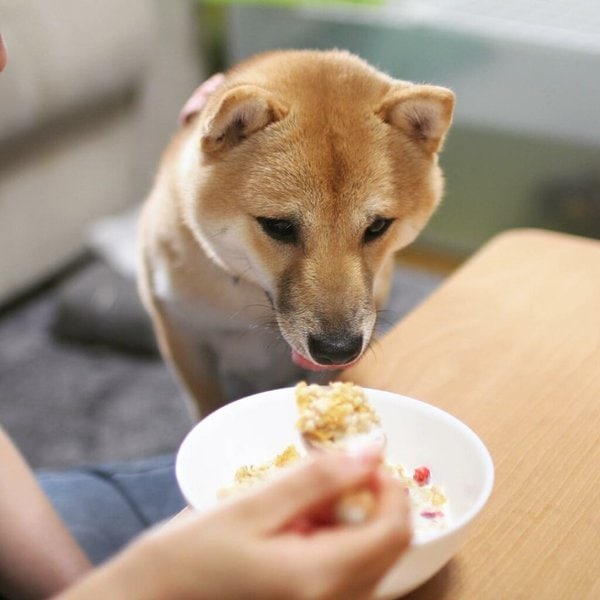
The biggest danger that a piece of a plain granola bar poses to your dog is that it can cause temporary diarrhea due to its high fiber content. Some individuals choose whole-grain diets like oatmeal and brown rice for their dogs because of their digestive irregularities.
What Kind Of Granola Can Dogs Eat?
There are a lot of granola bars that are fine for dogs, but some of them may contain harmful ingredients.
As a matter of fact, many granola bars contain substances that are quite dangerous for dogs. They pose a major threat to your dog’s health and life, even in tiny amounts. Make sure you have the right kind of granola bars before you decide to offer your dog some.
Whole-grain granola is safe for dogs to consume and may even be advantageous to their health. Granola with raisins, however, may be poisonous to them. Therefore, granola is safe for dogs to eat as long as you pay attention to the ingredients.
Can Dogs Eat Peanut Butter Granola?
Granola with peanut butter is safe for dogs to eat as long as it doesn’t include xylitol. If no xylitol or other dangerous components are listed on the ingredients list, the product is safe to give to your dog.
Can You Feed Honey Granola To Your Dog?
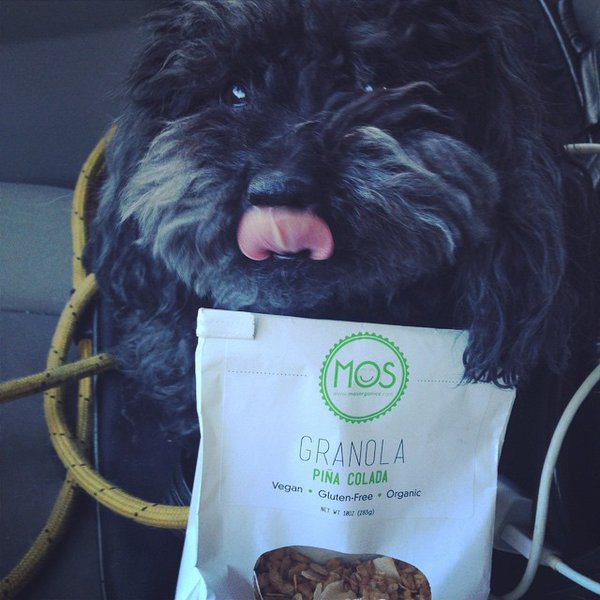
Honey is considered harmless for canine breeds when fed in moderation. In many instances, it is actually a better and healthier choice than sugar. However, it is still a sweet treat and is best only when consumed in moderation.
Can Dogs Eat Granola Cereal?
Granola cereal is safe for dogs to eat as long as it doesn’t include any dangerous substances. Rolled oats and puffed brown rice, which make up most of the granola cereal, are both suitable ingredients for dogs.
Can Dogs Eat Nature Valley Granola Bars?
You can securely feed your dog a few bites of Nature Valley’s granola bars as long as they don’t contain chocolate or raisins. However, you shouldn’t offer them whole bars regularly throughout the day.

